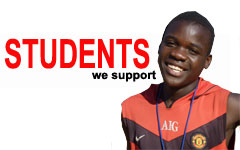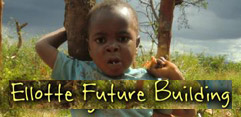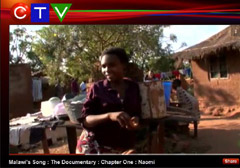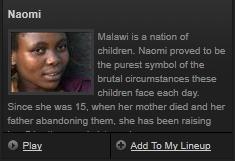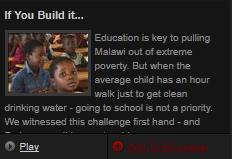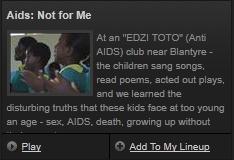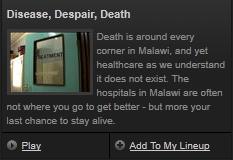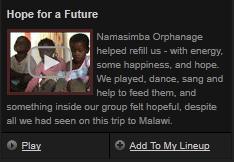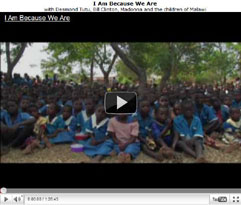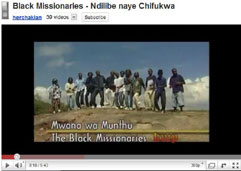

| Why Touch and Feel Africa? | |
Canada email: Skype |
I just recently returned from 6 months traveling in Africa. Without a doubt, it was one of the most interesting, rewarding, challenging and perplexing traveling I have ever done. And it was most certainly, the most emotional traveling I have ever felt. I went to Africa to experience the people. The elephants and lions, the great panoramic vistas, the cities, the towns, the villages, were always there, but my focus was to spend time with the Africans. Often my African friends thought I was crazy. Why do you pass up an opportunity to go for a weekend on a private game reserve and choose to go to visit people in Soweto? When I arrived in Africa, I had my biases and beliefs. Having spent the last 40 years of my life, traveling many places of the world, I thought I would see and understand Africa. The longer I stayed, the less I understood. Africa is complex. What is your "truth" one day, is often proved "wrong" the next day. And Africa encompasses every life style in the planet, to the extreme. There are those who live in countries like Malawi, many of who live on less than a $1 a day. Malawi is probably best reflects one of our beliefs of Africa, the poor, the Africans living in their villages with very few of the "modern" conveniences, no power, seldom running water. People, who always greet you with a huge smile, ask "how are you", and are so willing to befriend you. The other extreme is probably South Africa, certainly reflected in a stay in Johannesburg. Although some of the "conveniences" we associate with our lives in the United States are not part of Johannesburg life, I have never seen so many Mercedes and BMW's in my life. Our walks to Zoo Lake on a Sunday, were always interrupted by the roar of Ferraris, racing up the streets. The huge homes, all enclosed by high walls with razor wire and electrical fences. With huge, modern shopping centers, vibrant theatre life and nightclubs. And then the other extreme. There is the townships, where people try to make it by in life with so little and so little opportunity. I have little doubt, that like me, most whites from the US, Mzungu, as the Africans call us, have a deep fear and concern about how they will be accepted by the Africans. From my experience in 6 months…we are not only welcomed and truly befriended, they love to see us travel and see their countries. Most often teenage boys would see us through bus or train windows, give us a big "thumbs up" and a huge smile. Kids would run to us, often wanting to hold our hands and follow us anywhere. You could meet an adult on a bus, on the street or walking through their village, and they had the time for you and always loved to talk and share. Often people have said to me, they want to befriend you because they want your money. My experience was that although some did, the vast majority never asked for anything. Unemployment is high in Africa and especially in South Africa which is "host" to many undocumented immigrants and refugees. These people are not allowed to work, so they must be creative just to stay alive. It doesn't take long to understand why crime in Johannesburg is some of the highest in the world. Then there are the kids and young adults, who "help" you park your car on a city street or in the mall parking lot and then "guard" it while you are away. After I was in Africa for a couple of months, the people who were doing their best to help me park my car, really started to annoy me and often I felt anger towards them. I didn't need help to back up my car in the mall parking lot, and I really didn't feel my car was in much danger if they weren't there to look after it. I didn't feel like I wanted to give them any money and wanted them just to go away. Then my perspective changed. After a couple more months in Africa, I found I was spending a great deal of time chatting with these people who "worked" on the streets parking cars or giving out leaflets. I would be coming home from a restaurant or bar, sometimes late in the evening and I would stop for a chat, sometimes lasting an hour or more. These people, usually boys or young men, would tell me their stories. Often they were from the Congo or Zimbabwe, worn torn or financially ruined countries. They told me where they lived, and how they lived. My heart went out to them. As most of them were not able to work legally, they were usually abused financially by those who employed them. After talking to many of them for many hours, over many days, I could not see "light" at the end of their tunnel. I had no solutions for them. Not once, not once, did one of these "kids" ask me for anything. After an hour talking to them, I would go back to my hotel, crawl into bed and realize how much they had energized me. They motivated me. All my "problems" seemed so unimportant to life as a whole. I have no idea how they saw me. Perhaps I will know on one of my next trips to Africa. But it really doesn't matter. I have come back with a great emotional attachment to Africa and the African people. They have become my best friends. Hardly a day goes by when I am not talking to someone on the phone in Africa. I help activists in Botswana by building and maintaining their websites. I have a boy, Augustine in Malawi, who I am helping go to school. I met Augustine on Likoma Island in the middle of Lake Malawi. He was sitting on a bench watching us as we were chatting with the parents of an albino child who, with because of our traveling friend Jack, we had come to bring clothing and sunblock. I wondered over and said hi. Two weeks later, we had decided to sponsor Augustine to school and had experienced the bureaucracy of the school system in Malawi. The bureaucracy ensured that we met most of the important education people in Nkhata Bay, Malawi and several school headmasters. After 4 years of not having the means to go to school, Augustine is now in class. He is one of over a million orphans in Malawi. It's hard to go to school and complete your education in Malawi if you have parents. If you are an orphan it is next to impossible. I now feel more like a "Dad" than a sponsor. I email and chat with Augustine, sometimes many times during a week. Like kids here, they often have their problems. The problems have ensured that I get to know teachers and headmasters at the schools even better. Augustine was the beginning of my involvement with the students of Malawi. Meeting Mary Nyirenda, headmaster of Mkondezi School, 720 students in a village near Nkhata Bay started my next project. Mary was cooking us dinner one night and I asked her, "what do you need most for your school?" She said lights. She went to another room and returned with various broken flashlights. There is no electricity in her village. The school does not have electricity. It gets dark around 6pm and the students cannot study without lights. So on my return home, I contacted Nokero, a company based in Denver who has developed a solar rechargeable/LED light. You just hang the light outside during the day and then you can use it at night. Msani and Mkondezi School have just received two cases of 80 lights for use and evaluation. As fate would determine, I would meet Professor Wiseman Chijere Chirwa. We were riding on a load of gravel in a gravel truck going with Augustine to his school, and the truck pulled into a new school to dump its load. As we were sitting, waiting under a big tree, we were welcomed by Professor Wiseman as he came out to greet us. Professor Wiseman, as I call him, was excited to see us and when he learned we were living in Vancouver, Canada, he told us how he spent 5 ½ years in Canada a received his Masters and PhD at Queen's University near Toronto. He then told us how he had to return home to help. And help he did. He has financed and built his school out of his Professor's income. He has 125 students now and planning to double that in the next few years. His big goal is a girl's dormitory so that more girls can go to school. My next project was sending him a dozen computers for use in his school. Hopefully this is all going to happen in the next 90 days. Now I am working get $35,000 in financing to build the girls dormitory. Professor Wiseman is a workaholic. Not only does he teach at the University of Malawi, he is headmaster and runs his school, Msani school. He is also known in Malawi for his work for human rights. I could not have found a better person to team up with. He knows how it "works" in Malawi. He knows how it "works" in Canada and the United States. And most important he knows and has proven that he can make it work in Malawi. So I am asking you this evening to help me finance a girl's dormitory. It's only $35,000 and an incredible bargain to educate girls in Malawi. Why focus in educating girls? According to Time Magazine "In recent years, more development aid than ever before has been directed at women - but that doesn't mean it is reaching the girls who need it. Across much of the developing world, by the time she is 12, a girl is tending house, cooking, cleaning. She eats what's left after the men and boys have eaten; she is less likely to be vaccinated, to see a doctor, to attend school. "If only I can get educated, I will surely be the President," a teenager in rural Malawi tells a researcher, but the odds are against her: Why educate a daughter who will end up working for her in-laws rather than a son who will support you? In sub-Saharan Africa, fewer than 1 in 5 girls make it to secondary school. Nearly half are married by the time they are 18; 1 in 7 across the developing world marries before she is 15. Then she gets pregnant. The leading cause of death for girls 15 to 19 worldwide is not accident or violence or disease; it is complications from pregnancy. Girls under 15 are up to five times as likely to die while having children than are women in their 20s, and their babies are more likely to die as well. There are countless reasons rescuing girls is the right thing to do. It's also the smart thing to do. Consider the virtuous circle: An extra year of primary school boosts girls' eventual wages by 10% to 20%. An extra year of secondary school adds 15% to 25%. Girls who stay in school for seven or more years typically marry four years later and have two fewer children than girls who drop out. Fewer dependents per worker allows for greater economic growth. And the World Food Programme has found that when girls and women earn income, they reinvest 90% of it in their families. They buy books, medicine, bed nets. For men, that figure is more like 30% to 40%. "Investment in girls' education may well be the highest-return investment available in the developing world," Larry Summers wrote when he was chief economist at the World Bank. Of such cycles are real revolutions born. The benefits are so obvious, you have to wonder why we haven't paid attention. Less than 2¢ of every development dollar goes to girls - and that is a victory compared with a few years ago, when it was more like half a cent. Roughly 9 of 10 youth programs are aimed at boys. One reason for this is that when it comes to lifting up girls, we don't know as much about how to do it. We have to start by listening to girls, which much of the world is not culturally disposed to do. Development experts say the solutions need to be holistic, providing access to safe spaces, schools and health clinics with programs designed specifically for girls' needs. Success depends on infrastructure, on making fuel and water more available so girls don't have to spend as many as 15 hours a day fetching them. It requires enlisting whole communities - mothers, fathers, teachers, religious leaders - in helping girls realize their potential instead of seeing them as dispensable or, worse, as prey." People often ask me, "Barry, why Malawi?" It's so easy to answer. It's where I can make such a huge difference to someone's life. I can change a person's life forever. I can provide a good education for so few dollars. Girl's are most vulnerable and with help from us they can grow to be woman with a future. A few dollars can eliminate hardship and often death. AID/HIV is a huge problem in Malawi. It is education that will change this. Without education the problem will only increase. And why Malawi? I am good at what I am doing in Malawi. To be successful, you need to be "hands on". Money is not a solution on its own to the problem. We all know that very well. It has to be managed. It has to be used well. And most importantly, we all need to know the money we are providing is going 100% to the project we are funding. I love Malawi and I certainly love the people. I am returning again at the end of June. I want to be there. It is important to nurture and guide the projects. It is important to ensure that the project does what it is intended to do. If you want to see "true success" in the creation of schools in the most difficult of situations, I recommend reading "Three Cups of Tea". Greg Mortenson tells his story of creating schools in Afgahnistan and Pakistan. He shows us why he is successful. We will never be successful, just sending them money. We will seldom be successful creating something for them. It is when the people are creating their own project, which they want and need to happen, that a little help from us can make the difference between success and failure. And that is what is happening in Nkhata Bay Malawi. Thank you for your time,
I am just completing a 6 month "adventure" exploring Africa. The continent of Africa is huge and perhaps one of the most culturally diverse. It is certainly a place where a "generalization" is seldom a reflection of the actual reality of the country and its people. I began my first worldwide travels when I had just turned 21. My fascination with the world only increased and I have been able to experience places as diverse as London and Paris, to many times traveling through USSR and the "communist bloc", Thailand, Costa Rica, across South America from Peru to Argentina and Brasil, Mexico (often with our dog), and all over Canada and the US. Traveling is not a vacation, and most often can be very tiring and challenging. Traveling to me is getting up in the morning, knowing you are going in a certain direction, having a destination in mind, but knowing that you may not get there today or even possibly in the future. When one travels, you see the sights and take in the must see "tourist" attractions. but it is more. It is meeting and befriending your fellow travelers, learning about them and where they are coming from and going to. Malawi is truly a "gem" for those who want to experience people with a "cultural difference". There are very few similarities between how the "typical" Malawian lives and how we live in Canada and the United States. Most students in these schools have never experienced a movie theatre nor slept in a "real" bed. And the rewards to you...incredible! To learn more, to join us through travel or financial support, or just to chat and share your ideas.... Barry Thorsness We are still in touch. When I spoke to Thomas shortly before coming to Africa, he was about to go out with his son Beau who is now 17, and teach him to drive.
|
 |
 |
Visit our associate's websites! Volunteer for projects in Africa |
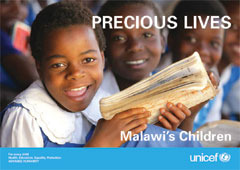 |
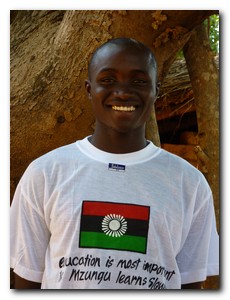 education is most important education is most importantthe Mzugu learns slowly |
|
The Malawi Education Foundation
is tax exempt under section 501 (c) (3) of the Internal Revenue Code

